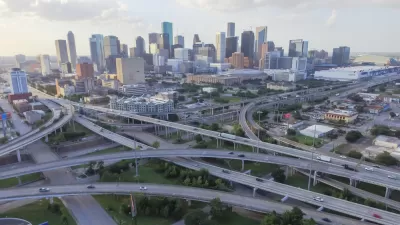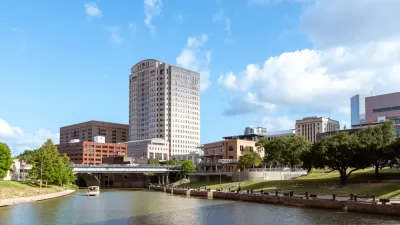Jeff Speck, planning consultant and author of Walkable City, writes an opinion piece for the Houston Chronicle to oppose the plan to widen the I-45 freeway in Houston.

Jeff Speck writes in "the hope of helping a major metropolis to make itself better." The steps required to make that vision come true, is for the city to effectively oppose a plan proposed by the state department of transportation to spend $7 billion to $10 billion widening Interstate 45.
Speck is thoroughly opposed to the project, known officially as the North Houston Improvement project (NHHIP):
The planned expansion of I-45, as it is being perpetrated upon Houston by the Texas Department of Transportation, can be described as having significant costs and significant benefits. The costs are best understood as tremendous, and the benefits are best understood as false.
Speck argues that such a destructive plan exists at all, and is being hastily ushered through to approval by the TxDOT should be the subject of public scrutiny, and a proper accounting. To help drive home the potential costs of the project, Speck provides a startling list:
...By TxDOT’s own admission, this expansion will destroy no less than 1,235 units of housing, home to about 5,000 people. These people may not land on their feet: The citizens I met in the Delaney Street Homes worry that TxDOT’s version of “fair market value” will not allow them to afford houses of similar quality nearby.
The expanded highway will also plow through 331 existing businesses providing almost 25,000 permanent jobs. Together, these residential and business losses are predicted to cost Houston about $135 million in forgone city property and sales taxes each year.
Those financial and economic costs pale in comparison to the human costs, according to Speck, before also tackling a laundry list of false benefits, induced demand, air quality impacts, and more. Two futures lie before Houston, according to Speck. "If I-45 is widened, it will be remembered that, in the decade prior, Houston enjoyed a brief glimpse of a better future."
FULL STORY: Widening I-45 will be a disaster for Houston

Alabama: Trump Terminates Settlements for Black Communities Harmed By Raw Sewage
Trump deemed the landmark civil rights agreement “illegal DEI and environmental justice policy.”

Study: Maui’s Plan to Convert Vacation Rentals to Long-Term Housing Could Cause Nearly $1 Billion Economic Loss
The plan would reduce visitor accommodation by 25% resulting in 1,900 jobs lost.

Why Should We Subsidize Public Transportation?
Many public transit agencies face financial stress due to rising costs, declining fare revenue, and declining subsidies. Transit advocates must provide a strong business case for increasing public transit funding.

Paris Bike Boom Leads to Steep Drop in Air Pollution
The French city’s air quality has improved dramatically in the past 20 years, coinciding with a growth in cycling.

Why Housing Costs More to Build in California Than in Texas
Hard costs like labor and materials combined with ‘soft’ costs such as permitting make building in the San Francisco Bay Area almost three times as costly as in Texas cities.

San Diego County Sees a Rise in Urban Coyotes
San Diego County experiences a rise in urban coyotes, as sightings become prevalent throughout its urban neighbourhoods and surrounding areas.
Urban Design for Planners 1: Software Tools
This six-course series explores essential urban design concepts using open source software and equips planners with the tools they need to participate fully in the urban design process.
Planning for Universal Design
Learn the tools for implementing Universal Design in planning regulations.
Smith Gee Studio
Alamo Area Metropolitan Planning Organization
City of Santa Clarita
Institute for Housing and Urban Development Studies (IHS)
City of Grandview
Harvard GSD Executive Education
Toledo-Lucas County Plan Commissions
Salt Lake City
NYU Wagner Graduate School of Public Service





























